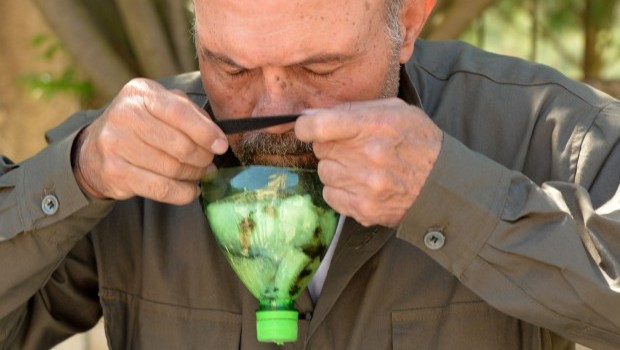
A Syrian man tries on a homemade gas-mask assembled using a plastic bottle, coal, cotton, gauze, cola, and cardboard, for protection against chemical weapons, in Syria’s northern Latakia province, April 26, 2013 (AFP PHOTO / MIGUEL MEDINA)
London, Asharq Al-Awsat—Uncertainty continues to surround the allegations of the use of chemical weapons in Syria, after US and British officials said this week that evidence had emerged that the Syrian government had used nerve gas on the battlefield.
In a letter to American legislators on Thursday, US officials said that American intelligence agencies believed “with varying degrees of confidence” that the Syrian government had employed chemical weapons on two occasions, while the British government said this week that it had evidence of the use of sarin nerve gas on three occasions in Homs, Damascus, and Aleppo.
However, both governments also stressed that the evidence gathered so far was not enough to say definitively that chemical weapons had been employed.
Speaking to reporters at the White House, President Obama said yesterday that the open use of chemical warfare agents would be a “game changer” that would force the US to re-examine its approach to the conflict, though he stressed that more evidence of this was needed before any decision was made.
“The use of chemical weapons and the dangers that poses to the international community, to neighbors of Syria, the potential for chemical weapons to get into the hands of terrorists—all of those things add increased urgency to what is already a significant security problem and humanitarian problem in the region,” he added.
Obama had previously warned that the use of chemical weapons represented a “red line” for the United States.
British Prime Minister David Cameron told the BBC: “It is very disturbing what we are seeing. It’s limited evidence but there’s growing evidence that we have seen too of the use of chemical weapons, probably by the regime.”
Both Cameron and Obama said that their governments would work with allies to learn more and gather more evidence.
Analysts say that the uncertainty expressed by the leaders of the US and UK reflected the limits of hard evidence for the use of chemical weapons, and doubts about how they are alleged to have been used.
Shashank Joshi, a researcher at London’s Royal United Services Institute, a defense think-tank, said: “I think that they have clearly quite good confidence in the fact that there has been sarin exposure . . . The UK would not have gone public if they were not certain. What is not clear is: When did it occur? Was it exposure or was it an attack?”
He also questioned why the Syrian government would take such a risk, given the warnings issued by the US, and why the weaponry was used on such a small scale: “I still find it strange that they would take the risk of using this . . . to me it’s a little bit puzzling.”
Dr Christopher Phillips, a Syria specialist at the Chatham House international affairs think-tank, offered a possible explanation, suggesting that if the reports are true, the Syrian government may be testing the limits of international tolerance.
He said: “The Assad regime . . . has got the stockpiles and it has shown right from the word go that it is determined to crush the uprising. The only question has been how far it will push the international community. It is clearly trying to see what it can get away with.”
Meanwhile, the Syrian branch of the Muslim Brotherhood said this week that it was preparing to open offices in rebel-held areas. Until now, the Syrian Muslim Brotherhood has existed in exile since the uprising in the city of Hama in the early 1980s, at a cost of thousands of lives and the destruction of much of the city.
In an interview with London’s Financial Times newspaper, the head of the organization, Riad Al-Shaqfa, said: “In the beginning we said this is a time for revolution, not ideology. Now there are many groups inside [Syria] so we feel we should reorganize.”
He added that the group hoped to counteract the presence of radicals in the country, and promote a more moderate political program.
The new move is likely to raise concerns among other groups active in the Syrian opposition, who are wary of the Brotherhood’s influence behind the scenes and have accused it of seeking to use its organizational and financial muscle to dominate the opposition.
Last month, secular activists with the Syrian National Coalition were angered when the Brotherhood’s favored candidate was elected prime minister of the interim opposition government.
Shaqfa denied that his organization was attempting to control the opposition as a whole, and said that any influence the group wielded was because it is well-organized.
He told the Financial Times: “If we hadn’t pushed to form the Syrian National Council it would not have been formed, Because there were no other parties.
“Others were not as organized or strong,” he added.
